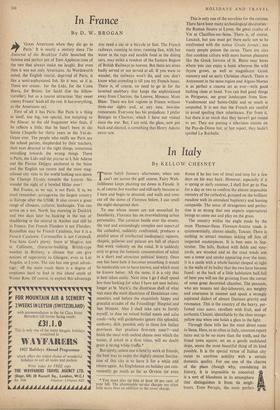In France
By D. W. BROGAN 'GOOD Americans when they die go to Paris.' It is nearly a century since The Autocrat of the Breakfast Table launched the famous and perfect jest of Tom Appleton (one of the two that always make me laugh). But even then it was not only Americans. As Wordsworth noted, the English tourist, deprived of Paris, is like a semi-asphyxiated fish. So it was; so it is. There are crazes : for the Lido, for the Costa Brava, for Brioni; for Sochi (for the fellow- traveller), but as a tourist attraction 'that sweet enemy France' leads all the rest. It has everything, as the Americans say.
First of all it has Paris. But Paris is a thing in itself, too big, too special, too tempting to the fldneur, to the old frequenter who finds, if he reflects a little, that he hasn't been in the Sainte Chapelle for thirty years or the Val-de- Grace ever. The people who really see Paris are the school parties, shepherded by their teachers, their eyes directed to the right things, sometimes swivelling towards the wrong things. There is Paris, the Lido and the piscine at L'Isle Adame and the Piscine Deligny anchored in the Seine and the English tea rooms and the most mag- nificent city vista in the world looking east down the Champs Elysees towards the Louvre. No wonder the sight of it bowled Hitler over!
But France, as we say, is not Paris. It is, we must remember, acreagewise the largest country in Europe after the USSR. It also covers a great range of climates, cultures, landscapes. You can arrive on a wet, North Sea morning in Dunkirk and two days later be basking in the sun or shuddering in the mistral in Antibes and still be in France. For French Flanders is not Flanders. Roussillon may be French Catalonia, but it is a French Catalonia. Cornouailles is not Cornwall. You have God's plenty. Snow at Megeve, sun at Collioure, character-building British-type weather in Brittany, a climate that can give notions of superiority to Glasgow, even to Los Angeles, at Lyons. The size has one great advan- tage: off the main roads there is a degree of emptiness hard to find in this island south of Wester Ross. Of course, to exploit this advantage you need a car or a bicycle or feet. The French railways, running to time, running fast, with hot water in the taps and eatable food in the dining cars, may strike a resident of the Eastern Region of British Railways as heaven. But there are areas badly served or not served at all. If you want to wander, the railways won't do, and you don't know what crowding is till you try French buses. There is, of course, no need to go in for the inverted snobbery that keeps the sophisticated away from Chartres, the Louvre, Monaco, Mont Blanc. There are few regions in France without three-star sights and, at any rate, two-star restaurants. Everyone has his prejudices; I prefer Bourges to Chartres, which I have not visited since the war. But, I am told, the glass, now put back and cleaned, is something that Henry Adams never saw. This is only one of the novelties for the curious. There have been many archeological discoveries : the Roman theatre at Lyons, the great cratere of 1. Vix at Chatillon-sur-Seine. There is, of course, Lascaux, but you must get there. early not to be confronted with the notice 'Grotte ferniee% too many people poison the caves. There are sites that combine culture with more human pleasures like the Greek fortress of St. Blaise near Istres where you can enjoy a bank whereon the wild thyme grows, as well as magnificent Greek masonry and an early Christian church. There is Antremont in the same region and Aigues-Mortes is as perfect a cinema set as ever—with good bathing close at hand. You can find good things in Perigueux, see great landscapes from Sion- Vaudenmont and Sainte-Odile and so much is unspoiled. It is not that the French are careful to avoid spoiling their inheritance. Far from it, but there is so much that they haven't got round to yet. They are putting a television station on the Puy-de-Dome but, at last report, they hadn't spoiled La Rochelle.










































 Previous page
Previous page